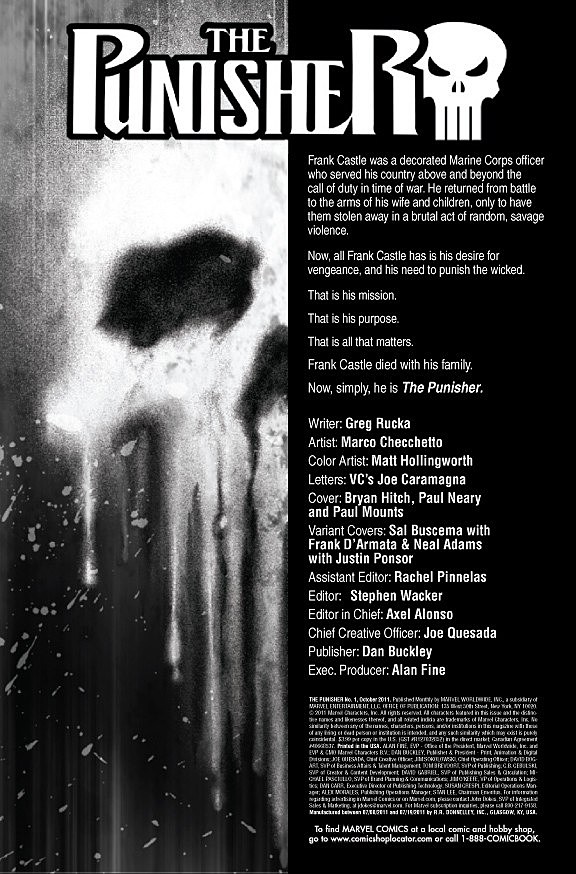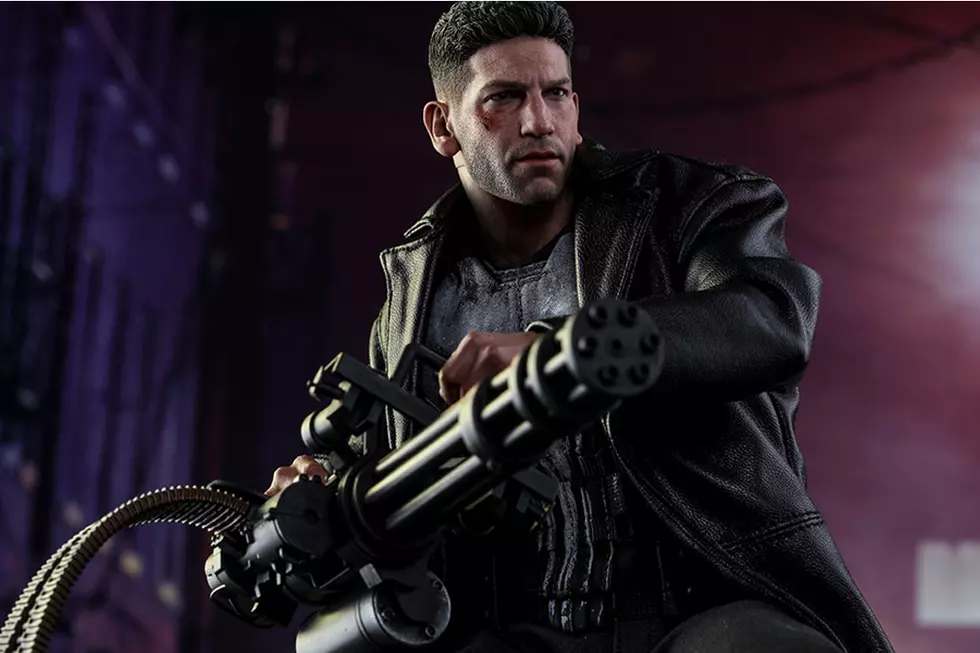![Greg Rucka on the ‘Punisher’ Relaunch, and Why Frank Castle is a Priest of Vengeance [Interview]](http://townsquare.media/site/622/files/2011/08/punisher-rucka.jpg?w=980&q=75)
Greg Rucka on the ‘Punisher’ Relaunch, and Why Frank Castle is a Priest of Vengeance [Interview]

The Punisher relaunched this week with an all-new #1 comic by Greg Rucka and artist Marco Checchetto, marking the long-awaited return of Rucka on an ongoing super-hero title after his departure from DC Comics last spring. We've got a big preview of the issue, and we also talked to Rucka about his take on the ultraviolent vigilante, why Frank Castle needs to be married to his single-minded pursuit of vengeance, and the new developments that are going to chip away at Frank's carefully constructed perception that he is more machine than man.
Greg Rucka: Let's talk about the Punisher.
ComicsAlliance: He kills people.
GR: That's our big selling point. [laughs] It does what it says on the tin.CA: This is going to be your first big super-hero ongoing series in a while, so one might expect that it's going to be something special or different.
GR: [laughs] I don't know what to say. It is special. It's a character I never ever thought I would write. I was talking about this in a [Marvel] liveblog earlier... Punisher never really appealed to me when I was much younger. He was scary to me, in a way. I'm in my 40s now, so we're going back a ways, but he scared me. What he represented scared me. The inherent politics that were present back in the '90s made me very uncomfortable. It's not that any of those things have gone away. Punisher is scary; he should be scary.
I think there's a danger in humanizing Frank too much. He's not crazy -- I don't even want to write him as crazy. He's not inhuman, and I don't want to write him as inhuman. But he is alien, and he needs to be alien to your experience, to my experience. This is a guy who has been through an obscene crime, just a horrible, hateful, devastatingly damaging trauma. And his response to that trauma is likewise dangerous and devastating.

CA: So we shouldn't be cheering for him.
GR: No, he's an anti-hero, absolutely.
CA: People cheer for anti-heroes.
GR: Then cheer for him. I'm not passing a moral judgment. There are things that we like about Frank, because he's cool. Frank is a badass, and we admire badassery in fiction. The great thing about the Daniel Craig [James] Bond is that he's so dangerously good, and Frank is much the same way. You're never going to put Baby in the corner. [laughs] You're not going to get away with putting one over on him, ever. And when he comes at you, he's going to come at you hard and smart and he's going to be clever and cool about it. But he's an anti-hero, very much the Clint Eastwood, Charles Bronson, Man With No Name type.
So we can talk about the trauma elements, but also at this point in Frank's life in the Punisher legacy both within the Marvel Universe and without it, that stuff has been covered and covered and covered again. That is retread territory, and I see no reason to go in there and monkey with it. It has been handled expertly by experts far more proficient than I. To me, the joy you're going to get in a Punisher story is watching him punish incredibly wicked people. Now, if you can add to that an emotional content, wonderful. But Frank does not carry his emotions. He has deadened himself, and in large part what I'm writing about what [editor] Steve Wacker and I have talked about is that Frank is the post-script to the revenge story. He's Moby Dick 2.
CA: He is now, or he always has been?
GR: He always has been. As soon as he gets his revenge, he's done. That kind of story demands that he ends there; there is nothing left after he has destroyed himself and forsaken himself and burned down the world to achieve his revenge. That sort of story traditionally ends with that character going off alone to die.
CA: And it's also about the lie of revenge, which is the idea that if someone does something horrible to you and you get revenge then you'll feel better. But obviously Frank doesn't. He can't stop.
GR: It's the second part of that I find fascinating. Can he stop? Does he want to stop? In my opinion, there's no story to be told about Frank meets young woman, falls in love. Because he's too broken, and because everybody knows how that story is going to end.
CA: She dies.
GR: Yes, and then he goes and kills everybody. And Frank knows that. Frank's not looking. Maybe this is one of the other things I find really compelling about the character: He knows he's broken. He's carrying that burden willingly. He knows exactly who he is and exactly what he's doing at every step of the way. And the moral man that was Frank Castle knows the seat in Hell that's waiting for him, and still he continues.
 CA: So he exists in a sort of purgatory where he's just walking around, acting all of this out endlessly?
CA: So he exists in a sort of purgatory where he's just walking around, acting all of this out endlessly?
GR: You're a dangerous interview, because you get way ahead of me on stuff. The recap text that we used -- the way Marvel books will have a recap at the beginning? There's a paragraph about how this is who he was, and then this terrible thing happened. And now, all Frank Castle has is his desire for vengeance and his need to punish the wicked. That is his mission, that is his purpose, that is all that matters. Frank Castle died with his family. Now, he is simply the Punisher. And as glib as that may sound in reading it, that is a perfectly apt and reasonably concise explanation of who this guy is.
CA: Well, there's a lot to unpack in there if you do it right.
GR: Absolutely. This is showing my hand a little early, but it's all well and good for Frank to decide that I'm dead, I'm walking death, and all that matters is the mission. But he's not.
CA: It sounds like what you'd probably need to tell yourself, though.
GR: So many writers have gone there and done it so well, but what makes Frank interesting for our purposes is seeing him through other people's eyes. And to do that we can't be in his head. But he has made choices because he is dead. That's a conceit, and that conceit can only extend so far. One of the things we're going to do is that the conceit is going to be challenged. We don't get into Frank's head, and I don't want to go there. He's going to thrown opposite another character that's going to chip at that, and it's going to be a very interesting interaction between the two.
CA: Then I imagine this is going to be something significantly different, because he's interacted with lots of characters before.
GR: Yeah. This other interviewed asked me, "Is he going to be working with anybody?" And this is not a guy that likes company. He's not hiring. If you end up working with him, you end up working with him because he can use you and because it is more effective for him to do that than to push you away or remove you in some other fashion.
CA: It's utilitarian.
GR: It's absolutely utilitarian, yeah. He's perfectly content to live on MREs. I think the idea of something that tastes good -- it's almost that religious asceticism. Anything that brings color or flavor or texture or joy into his life is not allowed. He can't afford it, because it will break this construct he's built for himself. If you offer him Saltines or caviar, he's going to go for Saltines, just on the basis that this is a luxury and this is not. And anything that risks making life replicate what his life was like before his wife and children were taken is a threat to the construct.
CA: So he has to remain emotionally Amish.
GR: Does that make sense?
CA: It does. If you start looking at the world in terms of pleasure -- if say, he got way too into art, that would open him up. You can't appreciate the world on that level without opening yourself up to something emotional.
GR: That's exactly it. You see his [place], and the only things that are art are going to be cue targets that show his groupings. There's maybe a schematic of a thing he's working on, but it's never going to one of those blueprints of the Chrysler Building or whatnot that you appreciate as a piece of art in and of itself. It can't be. That's a place you have to decide you're living in alone. You bring anybody else into it, and you risk a personal connection. And a personal connection will bring, for lack of a better phrase, color into the world again.
CA: Because connection is vulnerability, and if there's a vulnerability in him someone will exploit it.
GR: This is why [he has] no friends, no lovers, nothing. Axel and I had an early conversation about whether or not Frank had sex. And Axel [suggested] that Frank would maybe service the machine's needs, but my response was that he doesn't need to. He's really doesn't. There's a reason why you have wet dreams. And if he has a wet dream, he can just tell himself it was about Maria. But I do think it's a very delicate nerve ending he has developed, and he has to guard it very carefully.
CA: When you were talking about the asceticism before I was thinking about Jesuit priests, and the religious idea of putting yourself through discomfort, but also about the vow of celibacy. You're married to the Church, and Frank is like a priest of a religion of vengeance. Frank is married to it.
GR: I know [Matt] Fraction had imagined Frank as being a seminary dropout, and that he had been headed towards a priesthood of a sort, but it makes a lot of sense. and I think you come to that construct because he's a guy who has dedicated himself to a single duty. You have focused your life on this one task. The priest metaphor does carry forward.
More From ComicsAlliance







![Rogues’ Gallery: Who Is The Punisher’s Ultimate Enemy? [Poll]](http://townsquare.media/site/622/files/2017/01/Punisher-Vote.jpg?w=980&q=75)

